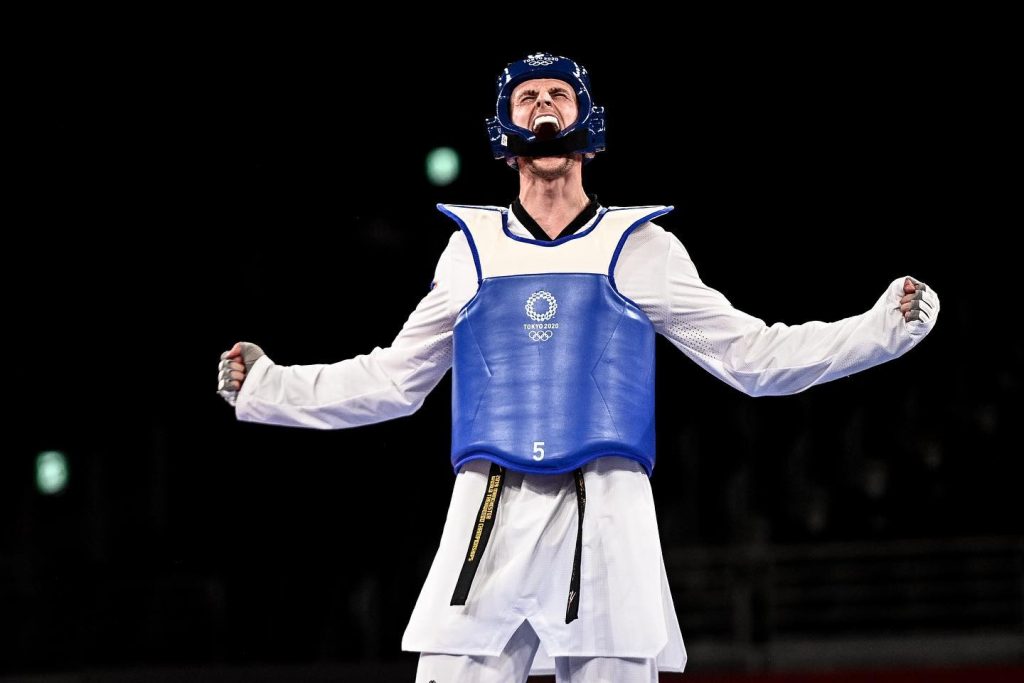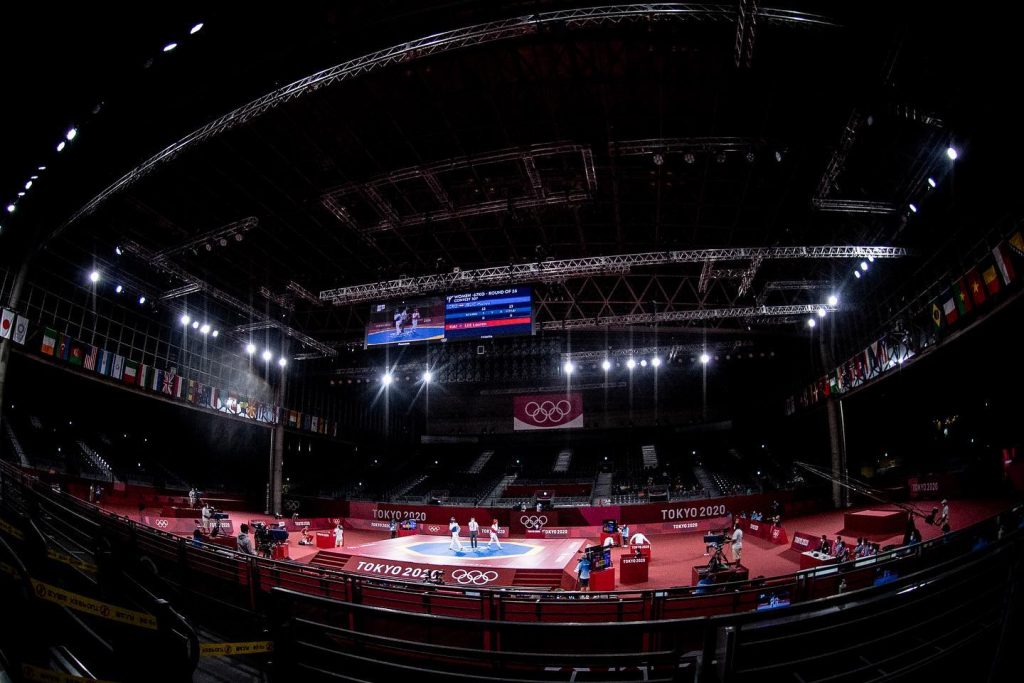There are two types of competition in Taekwondo, sparring (kyorugi) and patterns (poomsae). This page gives information about our kyorugi competition.
Competition sparring is a fun activity and one we recommend all students try out at least once. It is a chance to test your skills against new opponents and to represent your club as part an enthusiastic and supporting team. The aim of any competition is to learn and improve with students who take part gaining a much better understanding of where their own fitness and ability levels actually are.
What are the rules of competition?
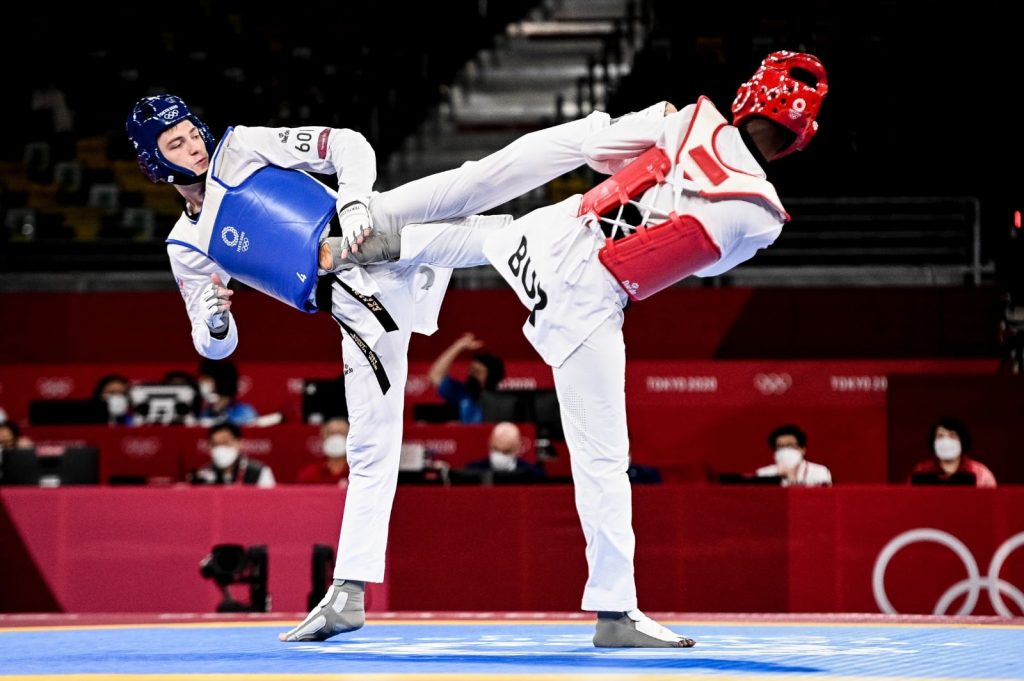
The rules of sparring competition do change from time to time and our team will train you in the rules and keep you up to date. However, as a very basic introduction, the aim of sparing competition is to win each match by scoring more points than your opponent. You are permitted to kick to the body above the belt, and to the head. You are only permitted to punch to the body.
If you win your match you will progress to the next stage. Typically this will be: last 16, quarterfinals, semi-finals and final. Gold, Silver and two bronze medals are awarded.
The number of fights you need to have in a day is very much dependant on how many people are entered into your category. This is announced before the competition starts but after the weigh-in has been completed.
Although you would think getting a medal is the goal, at the early stages of your sparring development you should hope for as many matches and get into as many competitions as you can to build up your experience.
What will I need for competition?
You need to bring your own protective equipment to competitions and it must be an approved make or you will not be allowed to compete. Some equipment is available to borrow for first timers from the club to help you out getting started, but once you decide you like it, you will need to get your own. For competitions you will require:
- Head guard
- A white or clear gum shield
- Body armour
- Arm guards
- Gloves
- Groin guard
- Shin guards
- Instep guards / e-socks
How do I sign up for a sparring competition?
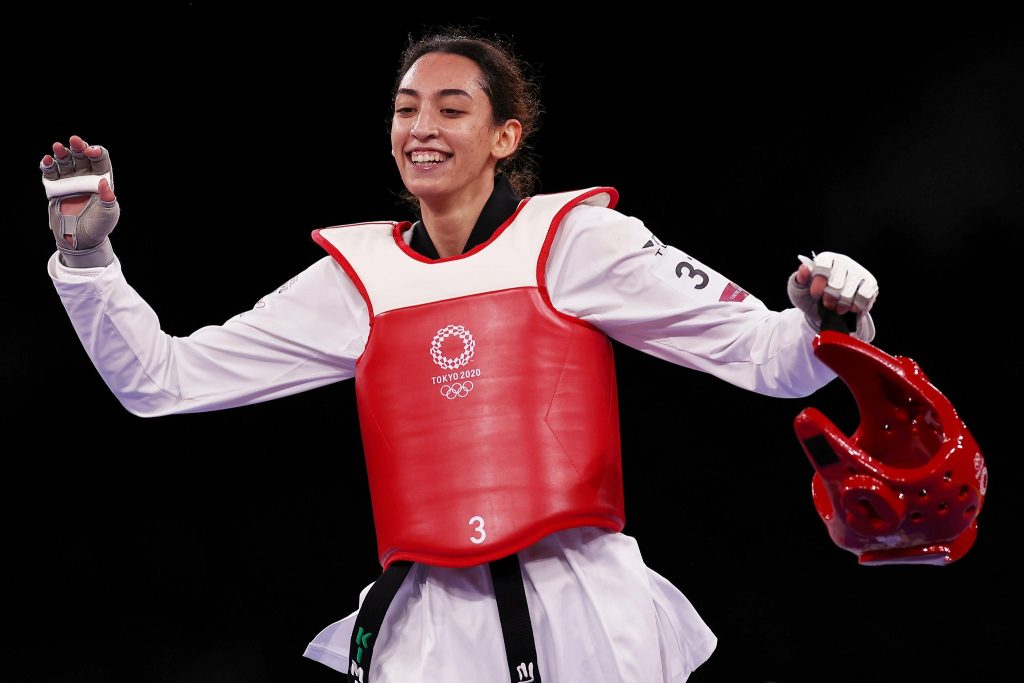
Keep an eye out in club chat groups for information on the next competition, as this is where we will let you know the date and locations of upcoming events.
Some competitions are close by with others requiring travelling and overnight stays. If you have not tried competition before, we recommend coming along to one of the local ones or test match days first, but feel free to speak with your instructor about any competition you are interested in.
Usually we ask students to add a comment on the appropriate post in the chat group to let us know if they would like to take part in an event.
How much do competitions cost and when do I need to pay?
The entry fee for each competition is set by the organiser and on average can range from around £25 to £50 for most UK based competitions. Events fill up quickly so it is important that you get your name down as quickly as possible if you would like to take part.
Because places are limited and we need to secure your place, payment should be made to the club as soon as you put your name down. Payment is generally non-refundable as we are not able to withdraw places once they are entered on the system, so please make sure you are free to attend when you put your name down.
Payment by our students is made to the same club account your monthly fees are paid to and the club will then pay the full team entry in one go to the competition organiser.
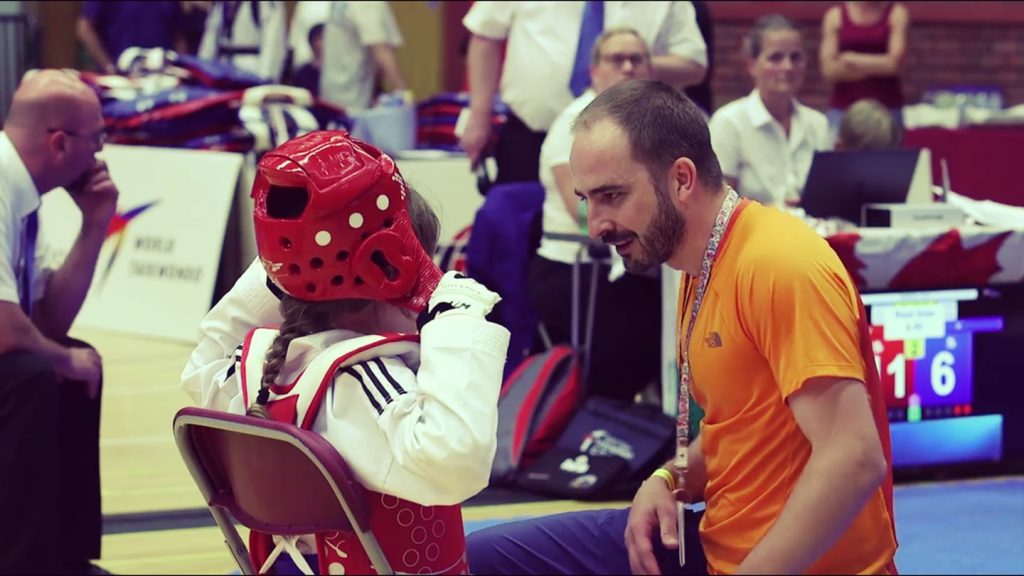
Who will I compete against and what are weight categories?
Competition categories are split by age and grade so you will be placed in the appropriate category for you. It varies a little but age ranges are usually. Pee-wee, child, cadet, junior and adult. Grades are C class (the lower grades) B class (the middle grades) and A class (red belts and above).
Within these age and grade categories competitors are split up into weight categories and you will be asked to select your weight category when you put your name down to enter.
As it sounds, a weight category is a defined weight range above one weight and below another. You will be required to weigh in at the start of a competition to prove you have entered into the correct category. If you fail this weigh in you could be disqualified or asked to pay an additional admin fee to change category. Because of this, it is important that you give us an accurate weight that you think you can maintain until the competition. We are able to make free amendments to these categories up to about a week in advance of the competition so we advise you keep an eye on the scales.
It doesn’t matter too much where you sit within a weight category but it is usually better to sit at the higher end so please speak with your instructor if you are close to the edge of a category for advice on what to do.
For children, we do not look to manipulate your weight beyond ensuring your are fit, healthy and strong.
For adults you may wish to discuss which category suits your build and if your instructor would advise a safe and managed change to your weight, but again this is only something you should be concerned with if you get a little more serious about competition.
What can I expect from a competition day?
In general, please stay calm and let your coach guide you through the day. They know what they are doing and they will manage all the things you do not need to concern yourself with. Your goal is to turn up on time, in shape and on form.
Once you arrive at a competition you will meet with the rest of the CYTA team then go to weigh in as a team. After this it is advisable to get changed into uniform and put on your shin guards, arm guards and groin guard, to be worn under your uniform.
Your instructors will likely lead some warm up pad work and once the draw has been released, they will advise you when you will be on.
Competition is a whole day event and even if you are eliminated we like our team to stay together to cheer and support each other.
When it is nearing your match time you will be asked to make sure you have everything on and are warming up getting ready to start the match.
Your coach will walk with you ringside where you will likely be waiting for the match in front of you to end. once they have finished you will be on and it will be your chance to get in there and give your best.
After the match, no matter what the outcome you will get feedback from your coach will likely be given things to work on to help you keep developing. If you have not won your match you can now chillout and learn as much as you can by watching the other matches going on. If you have won, you will need to recharge and get ready for your next match.
As it is a long day, you will need to bring lunch and pick the best time to eat and stay fuelled up.
What should parents of young fighters do to help?
Parents are often the main reason young fighters get over nervous and don’t enjoy their day. If you are a parent we ask that you try your best not to pass on your nerves to your child. Also we ask that the only advice you give to your child is for them to do their best, enjoy the experience and to listen to their coach.
Please do not try to give them advice on how to fight or what to do.
In the early years of fighting it is about building skills and getting experience and not just winning. Let’s just have fun for now and the victories will come soon enough. Parents are also encouraged to build on the positives after a fight and ignore the negatives. I promise you the coach has seen what needs to be worked on and will address this in training.
It is much easier to develop a child who is feeling confident and supported by friends and family.
There is a zero tolerance policy on abusive behaviour and foul language at competitions so please set an example by showing respect and composure to everyone. We do encourage enthusiastic positive support and you will get a chance to shout and cheer.
How you support your young athlete really does make a big difference!
Will I need to travel?

Competitions take place all over the country and it is sometimes necessary to travel for hours at a time to get to them. Some competitions will require overnight stays as well, but don’t worry these trips are always good fun and help build a good team.
If you wish to progress to the higher levels of competition, travel is something you must be willing to do.

Once you have some more experience you may be able to join CYTA’s international fighters. Also access to the British Development Squad, the British Team and world events such as the Olympics is all within reach if you are willing to put in the work. How far can you go?
How soon can I compete?
Please feel free to show interest in competition as soon as you want to. This will help your instructor know your aims and allow them to start working with you and getting you involved the the clubs squad activities.
There is no minimum grade or level of experience stipulated by most domestic competitions but you will need your coach enter you into the competition and this is something they will only do when they are sure you have been training hard and are listening to the feedback you are getting.
We tend to encourage people to get involved as soon as possible as it’s much easier to start against other beginners rather than waiting until you have moved too far up the grades.
We often organise cross club training and test match days which are friendly and fun days designed to give you a close to competition experience.
Ultimately we ask that you trust your coach and listen to their advice. Some people pick up competition skills very quickly and other take a little longer to get used to it.
